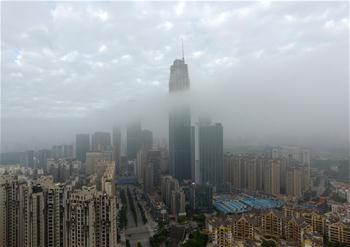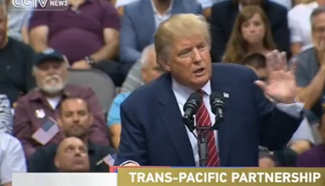by Matthew Rusling
WASHINGTON, Nov. 14 (Xinhua) -- After stunning the world by clinching the U.S. presidency, Donald Trump is gearing up for the coming power transition, but it remains unknown how he will govern as someone without any political experience.
While many had expected the controversial Trump to gloat after one of the most stunning political upsets in decades, the usually brash billionaire hit a conciliatory note and called for healing after a bitter campaign.
On Thursday, Trump met with U.S. President Barack Obama in a meeting that appeared cordial.
With Republicans controlling the White House and both houses of Congress, analysts expect the passage of much new legislation -- and the peeling back of many of Obama's laws and regulations -- to happen under Trump's presidency.
Still, it remains unclear what changes are ahead, as the Trump campaign left much unsaid in terms of particular policies.
"As far as what a Trump administration will look like, there is a lot of unanswered questions based on the vagaries of a campaign that focused less on policy plans and more on harnessing the dissatisfaction of the American people," Dan Mahaffee, an analyst with the Center for the Study of the Presidency and Congress, told Xinhua.
In the coming days, it will be important to parse the statements that come from not only Trump and Vice President-elect Mike Pence, but also key Republican Congressional leaders, as the combination of the Trump administration's priorities, as well as the Congressional agenda become clearer, Mahaffee said.
"I think that is where we will begin to see some significant action in terms of replacing and repealing Obamacare, an infrastructure plan, tax reform, and, possibly, an immigration plan that emphasizes significant enforcement measures," he said.
Indeed, Trump has vowed to repeal and replace Obama's controversial health care overhaul. While supporters of Obamacare said it has allowed millions of previously uninsured Americans to be insured, opponents point out that premiums have skyrocketed in recent months.
They also contend that the stiff and myriad regulations in the plan create difficulties that burden small businesses with regulation and have slowed hiring at a time when the economy has not fully recovered from the 2007-2008 economic nosedive.
Trump will also have to choose a cabinet over the next several weeks. While no names have been officially released, experts, pundits and political prognosticators have speculated that former New York City Mayor Rudy Giuliani is a possibility for attorney general.
Former House Speaker Newt Gingrich has been named by some media as a possible pick for secretary of state.
Trump will also have to fill at least one and possibly more seats in the Supreme Court. He has said he favors conservative-leaning judges, which is likely to spark a political row.
There also remain questions over how Trump will rule, as the bombastic businessman has a short temper and a sharp tongue, and has made outlandish remarks against his opponents and critics.
"As for the temperament of President Trump, thus far he has appeared conciliatory and presidential, yet it will be important to see how he and his team respond to any adversity, scandal, or public dissatisfaction with the early days of his transition and presidency," Mahaffee said.
Brookings Institution senior fellow Darrell West said that Trump will govern as he campaigned.
"It will be a mix of bombastic rhetoric and occasional forays into policy pronouncements," West told Xinhua.
On policy matters, West said the real action will be at the staff level."I expect Vice President Pence to be the real power behind the throne. He has experience in Washington and knows how to get things done," West said.
"With GOP majorities in the House and Senate, I expect there to be quick action in many areas. In short order, Congress will repeal Obamacare, cut taxes, and get very tough on foreign policy," he added.
The last several days since the election have seen protests in multiple cities by mostly young people who do not accept Trump as their president.
"There are protests, and I think much of that has to do from the immediate shock of the result of the election. However, with the exception of many young Americans, most people have a cautious wait-and-see attitude towards what the Trump administration will entail," Mahaffee said.










